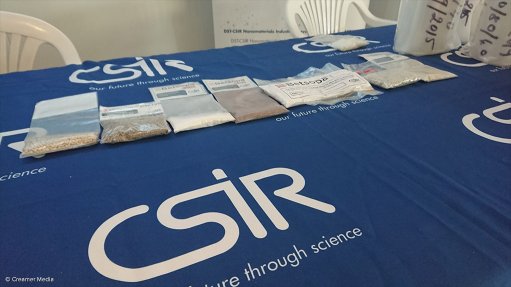
CSIR polymers and composites
At the third yearly Innovation Forum organised by industry association Plastics SA’s training division, in collaboration with the Council for Scientific and Industrial Research (CSIR), on Wednesday, speakers highlighted the need for innovation with regard to waste management, packaging and recycling.
The event is aimed at finding solutions to the challenges around waste management and recycling in Africa.
The CSIR is working on various technologies and developments with regard to processing polymers and other composites that can be reused, and is seeking to collaborate with plastic industry stakeholders.
At the forum, CSIR nanomaterials industry development facility senior researcher Dr Vincent Ojijo discussed how the CSIR is going about polypropylene (PP) beneficiation.
He explained that the CSIR is getting more involved in recyclate. The CSIR’s value proposition to the plastic industry includes access to research and development and testing capabilities, and scalability that can speak to the industry for market trials, as well as material characterisation. This offering stretches from polymer compounding to plastic product manufacturing.
The CSIR, which aims to contribute to improving the plastic industry’s competitiveness, is able to compound 10 kg/h to 20 kg/h of PP at its facility.
The CSIR is taking PP, doing its modifications and grafting, which then produces a material that is more rigid and 10% stiffer. The CSIR wants to partner with industry members to commercialise its Polizimo processing that creates a stronger, more productive PP material through beneficiation, ultimately reducing the need to manufacture PP anew.
Polizimo is patended in China, India, South Africa and Brazil.
Moreover, the CSIR designs and develops lasers used in three-dimensional (3D) polymer printing.
CSIR national laser centre research group leader Dr Hencharl Strauss discussed during his address at the forum that 3D printing uses two techniques – either fused deposition melting, which deposits layers of polymers or metal and then melts it with high-powered lasers, gradually building parts up; or selective laser sintering, which is used to create high-end products through powder melting and building layers gradually in specific areas.
These printers can use recycled material to make new products, which poses an attractive opportunity for increased recycling. These 3D printers can be used to print injection moulds that are used in the plastic industry.
It can also be used to print, from recycled polymers, products for use in the military or healthcare sectors.
Further, the CSIR is investigating the value-added use of agricultural biomass residues, such as sugarcane bagasse and maize stalks, which are normally discarded into waste streams, for the development of sustainable biobased polymer and biocomposite materials.
An area of special interest for the CSIR is the use of bioplastics in rigid and flexible packaging. Bioplastic shopping bags can be used for the life of the bag as an alternative to plastic bags, and will decompose once disposed of, thereby eliminating the waste problem associated with petroleum-based plastic bags.
The CSIR divisions involved with plastics have capabilities across the spectrum, including polymer formulation and additives; scale-up and testing facilities; bio-plastics development; encapsulation; fibres and composites research and development; additive manufacturing materials and techniques; policy, strategy, governance on waste and recycling development; and enterprise development, including in recycling.